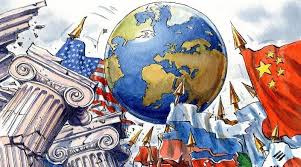Washington realizing unipolar world has ended: Russian academic

Washington has recognizes that the unipolar world has come to an end, although it does not yet know how to adjust to a multipolar world, says Glenn Diesen, an associate professor from the University of South-Eastern Norway.
After U.S. withdrawal from international treaties such as the nuclear deal, some experts pointed out that the U.S. decline as a global power has expedited.
"The more U.S. power decline, the more it will be prepared to use its administrative role in the international economic system to punish adversaries," Glenn Diesen tells the Tehran Times.
Following is the text of the interview:
Q: Do you believe that the 2015 nuclear deal was successful, or was it born dead?
A: The agreement reached a broad consensus in the international community, and Iran upheld its obligations. It would, therefore, be incorrect to say that it was born dead. The U.S. has only recently begun pursuing the policies of withdrawing from and renegotiating international agreements. This is, to some extent, a unique feature of the Trump administration, although it can also be interpreted as the U.S. attempting to reposition itself due to its relative decline.
The sanctions against Iran always had two functions, to prevent nuclear proliferation and to weaken a regional power that opposes the U.S. The nuclear agreement was successful to the extent it prevented or at least delayed Iran's nuclear potential. However, the removal of sanctions made Iran more powerful and difficult to contain in the region.
Q: Do you think that Washington's exit from the nuclear deal and other international agreements is merely a decision by the Trump administration or that the U.S. as a whole is moving towards such an approach?
A: The Trump administration has been withdrawing from many international agreements. The belief seems to be that key agreements have to be renegotiated to strengthen the U.S. position in the international system. The relative strength of the U.S. in the international system is reducing, and it is reasonable to argue that the status quo is not tenable.
However, this goes beyond the Trump administration. One month after the Soviet Union collapsed, President Bush announced in the State of the Union speech that the U.S. should re-start missile defense, and other documents revealed that it sought to cement the unipolar moment by undermining Russia's nuclear deterrence.
More recently, the U.S. also announced its unilateral withdrawal from the START Treaty with Russia and attempted to blame Moscow. Washington recognizes that the unipolar moment has come to an end, although it does not yet know how to adjust to a multipolar world.
Q: Don’t you think that Europe could have prevented U.S. withdrawal from the nuclear agreement?
A: Europe was not able to prevent the U.S. from withdrawing from the agreement. The Europeans are too dependent on the U.S. in terms of security and economy. The West's collective leadership makes solidarity the top priority, which unfortunately makes the application of international law inconsistent and often contradictory. The Europeans protest although they will eventually fall in line. The U.S. is now even threatening with sanctions against the Europeans if they abide by the Iranian nuclear agreement.
Q: Is there any international law to punish the U.S. for violating international treaties?
A: International law is largely a reflection of power, and the countries of the world have neither the ability nor willingness to punish the U.S. The lack of repercussions after the U.S. killed General Soleimani demonstrates that sovereign inequality is built into international law. The best thing to do for Iran, China, Russia, and other adversaries of the U.S., is to decouple from U.S. technologies, industries, transportations corridors, and financial instruments such as currency and banks. The more U.S. power decline, the more it will be prepared to use its administrative role in the international economic system to punish adversaries. The natural "punishment" of the U.S. is the subsequent incentives for countries like China and Russia to enhance Eurasia's economic connectivity and reduce reliance on the U.S.
Q: Don't you think that U.S. violation of the nuclear deal and Europeans’ inaction lead to the collapse of international agreements?
A: International agreements require a certain degree of trust. The problem of renegotiating nuclear deal is that Tehran has no reason to believe that the U.S. will uphold its obligations. This weakening of global governance was also recently expressed by Beijing. The U.S. is unilaterally withdrawing from the START nuclear treaty with Russia and demands China to be part of a new trilateral agreement. Beijing's response was to dismiss the U.S. proposal as a hoax that should not be trusted. Moscow is also growing weary of the U.S. breaching and withdrawing from international agreements.

